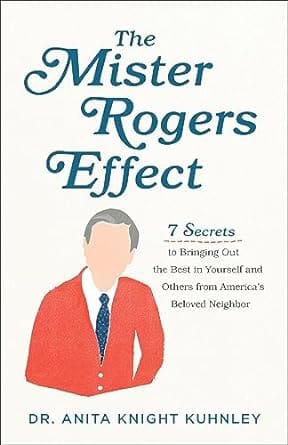- Home
- Entertainment
- Anita Knight Kuhnley and The Mister Rogers Effect (Part 2)

Anita Knight Kuhnley and The Mister Rogers Effect (Part 2)

John Farrell: Growing up, what kind of impact did Mister Rogers have on you?
Anita Knight Kuhnley: I can remember watching him come through the door, singing the song, and inviting you to be his neighbor and changing into his sweater and into his shoes. That was always my favorite part of the show. There was a joy in knowing what was going to happen, being able to anticipate that sequence. It was very comforting.
I think for me, Mr. Rogers always represented this sort of safe, fatherly, comforting presence, where you are always welcome, and it was always a beautiful day in the neighborhood. He would say, “It doesn’t matter what the weather’s like outside, it can be a beautiful day inside.”
I think it really taught me a lot about positive attitude and mindset, but I didn’t realize how profound of an influence that he had on me until later on, looking back at all the lessons learned. It’s interesting. Some of the research shows, and I wish I would have even watched him more than I did because I think he was on daily, but from what I have read in the research, they’ve found that kids who grew up watching “Mister Rogers Neighborhood” tended to have longer attention spans and greater levels of creativity.
It makes sense. He always took us to “The Land of Make-Believe.” So, you were encouraged to use your imagination in every episode. Not to escape reality, but to go to “The Land of Make-Believe” to deal with reality. They would have conversations. The puppets would talk about things like divorce and heartache and pain.
Kids may not have always had a safe place to talk about those things, but you could be safe to talk about those things with him. He would even talk about the obvious at times. For example, once there was an episode on divorce and Mr. McFeely came over and played an old video from his wedding ceremony. They talked about marriage and then Mr. Rogers mentioned, “Sometimes people get divorced.” Mr. McFeely seemed to get a bit uncomfortable and then he sort of hurried away to finish his speedy deliveries, and Mr. Rogers said, “Mr. McFeely didn’t really want to talk about that.”
He basically reflected on the idea that sometimes people don’t feel comfortable talking about those things. What a powerful way to help children understand and be empathic.
You asked earlier about some of the main messages, and I think that they were distilled into kind of seven keys. I think one that is pretty powerful is the idea that feelings are mentionable and manageable. You could go to “The Land of Make-Believe” to deal with different feelings and act them out in a creative, expressive way. It seemed like Daniel Tiger was the way [Mister Rogers] would express and process vulnerable emotions. King Friday was the more authoritarian aspect. The different puppets allowed him to express himself in different ways, and he advocated for kids to do the same. To make you believe that if we could find ways to work through our feelings, especially painful emotions like anger, in ways that don’t hurt us or don’t hurt anyone else, that the world could be a safer place for the children of tomorrow. I think that is one of the powerful pieces of the Mr. Rogers Effect.
The Importance of Listening
JF: Of the seven secrets that you discuss in the book, which one do you feel is the most important?
Anita: That’s a tough one. I think they all have so much value. The first one that is discussed in the book is this idea of listening with more than your ears. It’s interesting because we don’t think of Mr. Rogers necessarily as listening because he was on the program and he was talking. But what he did do is he had a mentor, Dr. Margaret McFarland, who worked at the University of Pittsburgh. She supervised his counseling work, and she worked with some of the greats in psychological development – Benjamin Spock and Eric Erickson. Really influential theorists in human growth and development at that time.
One of the things she did was meet with Mr. Rogers regularly to consult with him and give him insight for his programming and help him understand what children of that age needed. He listened to her and wanted to know about the needs of children, and he applied that in his programming.
There was one example where a child said, “Wow, mom. I think he knows my name.” It was a young child watching the program who felt known and seen by Mr. Rogers. Mr. Rogers believed that listening is where love begins, because if we listen to someone, we listen to their heart, we can get to know them.
I think listening is definitely a good starting point, but I think each of them really have something important to offer in their own ways.
Feelings Are Mentionable and Manageable
JF: On the flip side of that, of the seven secrets that you discuss in your book, which one do you think most people struggle with?
Anita: A lot of them are challenging in some way, but if I had to pick, I would say two and three are oftentimes the most challenging. Secret two is this idea that feelings are mentionable and manageable.
A lot of times we get messaging so we’re always receiving information. Whether we’re listening to the radio or quietly sitting with our own thoughts or watching television, scrolling the Internet, reading websites, we’re exposing ourselves to different information.
A lot of times people get messages, even growing up from a young age, that it’s not okay to express your feelings. For example, growing up, did you ever hear things like, “turn that frown upside down” or “put a smile on your face” or “don’t cry or I’ll give you something to cry about?” Oftentimes people heard them from other adults in their life when they were growing up, so these messages are sort of perpetuated.
I think the intention can be good. The intention can be “regulate your feelings” or “don’t get overwhelmed by them,” but the challenge is that it can teach children that it is not okay to feel and that it’s not okay to express those feelings. Then people can keep setting those feelings aside. The problem with that is that they can build up and eventually erupt in one way or another and be very challenging to regulate.
Mr. Rogers learned from his mentor, Dr. Margaret McFarland, that anything human is mentionable and anything mentionable is manageable. He distilled the idea that feelings are mentionable and manageable. He wanted to teach these strategies for dealing with emotions, but I think, back to your question about what makes this so challenging; I think is that a lot of times people have grown up with these messages and grown up sort of believing, “I need to put a smile on my face. I need to turn that frown upside down. I shouldn’t say anything if I don’t have anything nice to say.”
As a counselor, when people come into counseling and the counselor says, “So, tell me about what brings you in today or share with me how you’re feeling,” as someone who’s grown up with these messages that they may have internalized to believe it’s not okay to feel or it’s not okay to be vulnerable and share, then it can be very difficult to open up and then connect emotionally. I think that’s one of the things that makes that particular secret pretty challenging.
JF: Mr. Rogers always seemed to employ the seven psychological principles or secrets, as you call them, covered in your book simultaneously. What is the best advice for others to be able to use and remember those secrets in unison with each other?
Anita: I think these psychological principles became a part of who Mr. Rogers was. I train counselors and one of the things that happens as counselors are going through their training, some of the skills they learn are really uncomfortable and tough to practice. But once they continuously practice them on a regular basis, they get easier and easier over time. Then they almost become a part of who they are.
For example, one time Mr. Rogers stopped production, which he seldom did, because someone had told a puppet, “It’s okay. Don’t cry.” He said, “You’re never to tell a child, an adult, or a puppet not to cry.”
Mr. Rogers believed that if someone told someone not to cry, it was because it really meant they were uncomfortable with that feeling. It was better to say, “It’s okay to cry. I’m here to be with you.” That’s a great demonstration of empathy, but also of listening.
We see how empathy and listening naturally fit together and also fit with this idea that your feelings are mentionable and manageable. As you’re willing to sit with someone and hear their emotion and then be present with them as they feel and practice empathy, we see these things starting to come together.
Each of the chapters has some items toward the end – sort of a bulleted list of ideas about how we can begin to practice this particular secret. My best recommendation would be to take them one at a time. Take your time reading through the book. Take your time to pause and reflect and think about how to fold this into daily life in small steps. Even small 1% changes add up over time and each one lends itself naturally to the other.
…
Order your copy of The Mister Rogers Effect: 7 Secrets to Bringing Out the Best in Yourself and Others from America’s Beloved Neighbor by Dr. Anita Knight Kuhnley
Image credit: Unknown Author / Henrietta Pussycat, Fred Rogers, and X the Owl / Public Domain
Are you looking for a show for your young children that you can trust to provide wholesome, spirit-filled lessons that will both entertain and educate? Look no further than Inspiration Kids’ new show, Gracie B and the Honeycombs. However, Inspiration Ministries needs your support to bring Gracie B and her friends to life. Please join us in funding this incredible Christian animated show that your kids will LOVE! Learn more at gracieb.buzz
Trending Now
Sign up today for your Inspiration Today Daily Newsletter
Supercharge your faith and ignite your spirit. Find hope in God’s word. Receive your Inspiration Today newsletter now!
John Farrell
John Farrell serves as the Digital Content Manager at Inspiration Ministries, where he oversees the planning, organization, and management of website content to support the ministry's global digital outreach. With a strong background in writing and editorial strategy, John ensures that the articles, devotionals, and discipleship resources on Inspiration.org are accurate, engaging, and aligned with the ministry's mission.
John has authored more than 1,000 articles, press releases, and features for Inspiration Ministries, NASCAR, Lionel, and Speed Digital. His versatility as a writer is also showcased in his 2012 book, The Official NASCAR Trivia Book: With 1,001 Facts and Questions to Test Your Racing Knowledge.
A graduate of Appalachian State University, John brings excellence and attention to detail to the digital experience at Inspiration Ministries. He lives in Concord, N.C., with his wife and two sons.
Related Articles
March 10, 2025
Finding Total Victory on the Road to Championship
I have been playing competitive golf for 55 years. Through the various stages of my life, my…
March 7, 2025
Average Joe Movie: SCOTUS, Praying Football Coach Backstory
When Coach Joe Kennedy knelt to pray at the 50-yard line after a high school football game, he had…
February 28, 2025
The Power of Story: A Muslim Journey to Hope
Storytelling is one of the oldest and most powerful ways to touch the human heart. Parents tell…
February 27, 2025
‘Harriet’ Movie: Courage, Freedom, Faith
Antebellum abolitionist Harriet Tubman had convictions and courage that helped free herself…
Next Steps To Strengthen Your Walk
Inspiration Today Newsletter
Supercharge your faith and ignite your spirit. Find hope in God’s word. Receive your Inspiration Today newsletter now!
Christian Articles
Find articles to strengthen your walk and grow your faith. We have a wide range of topics and authors for you.
Submit A Prayer Request
We are here for you. Simply click on the button below to reach us by form, email or phone. Together we will lift our hearts and voices with you in prayer.





